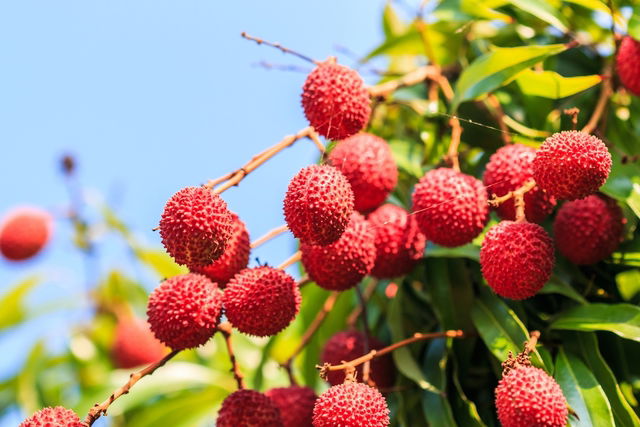Lychee fruit is an exotic, heart-shaped fruit with a sweet taste that originates from China. It is rich in phenolic compounds, minerals and vitamin C, which give this fruit powerful antioxidant properties. This fruit can help to protect against cardiovascular disease, diabetes and obesity.
Although it has many health benefits, lychee fruit is associated with side effects when consumed in excess, particularly a significant drop in blood sugar (hypoglycemia). Tea made using lychee fruit peel can also cause diarrhea or abdominal pain.
Lychee fruit can be purchased in supermarkets in its natural form or canned. It is also available in tea form and as a juice.

Health benefits
The main benefits of lychee fruit are:
1. Preventing cardiovascular disease
Because it is rich in flavonoids, proanthocyanidins and anthocyanins, which have a potent antioxidant effect, lychee fruit helps to regulate bad cholesterol, or LDL. LDL is responsible for the formation of fatty plaques within the arteries and can therefore help to prevent atherosclerosis and reduce the risk of cardiovascular diseases, like myocardial infarct and stroke.
In addition, lychee fruit helps to regulate fat metabolism and increases good cholesterol (HDL) levels, which contribute to overall cardiovascular health.
The magnesium and potassium contents in lychee fruit also help to dilate blood vessels. The phenolic compounds in these nutrients can inhibit the activity of angiotensin-converting enzymes, which acts directly on blood pressure regulation.
2. Preventing liver disease
Lychee fruit helps to prevent liver diseases like fatty liver or hepatitis, as it contains phenolic compounds like epicatechins and procyanidin. These compounds have potent antioxidant effects that reduce liver cell damage caused by free radicals.
3. Combating obesity
Lychee fruit contains cyanidin, which gives the peel its red color. Cyanidin also has antioxidant action that aids in fat burning. This fruit does not contain any fat, and is rich in fiber and water, which can promote weight loss. Although it does contain carbohydrates, it is low in calories and has a low glycemic index. Each individual fruit has about 6 calories, making it a great addition to a weight loss diet.
In addition, some studies should that lychee fruit inhibits pancreatic enzymes responsible for fat digestion. This can help to reduce fat absorption and accumulation in the body, making it a great accessory to a weight loss diet.
4. Managing blood sugar levels
Some studies show that lychee fruit can be a great complement to prescribed diabetes treatment. It contains phenolic compounds, like oligonol, which regulate glucose metabolism and decrease insulin resistance. These are important factors for the management of blood sugar levels.
Furthermore, lychee fruit contains hypoglycin, which is a substance the decreases glucose production.
5. Improving skin appearance
Lychee contains vitamin C and phenolic compounds, which are antioxidants that help to eliminate the free radicals that contribute to aging skin. Vitamin C also helps to boost collagen production, which is important for combating skin flaccidity and wrinkles and improving the overall quality and appearance of skin.
6. Strengthening the immune system
Lychee fruit is rich in nutrients like vitamin C and folate, which stimulate white blood cell production. These cells are an essential part of the immune system, and help to prevent or fight infections. Therefore, lychee fruit can be consumed to strengthen the immune system.
In addition, the epicatechins and proanthocyanidins in this fruit also help to regulate the immune system by triggering the production of defense cells.
7. Helping to combat cancer
Some laboratory studies on cancerous cells taken from the breast, liver, cervix, prostate, skin and lungs show that the phenolic compounds in lychee (the flavonoids, anthocyanins and oligonol) can help to decrease the growth and increase the death of these types of cancers. However, more studies in humans are needed to support this benefit.
Nutritional information
The following table outlines the nutritional information for 100 g of lychee fruit: .
It is important to highlight that to obtain all the benefits listed above, lychee fruit should be a part of a healthy, balanced diet.
Lychee fruit recipes
Lychee fruit can be consumed in its natural form or conserved in cans. It is also available as tea (made with the peel), juice and hard candy.
The recommended daily dose is 3 to 4 fresh lychee fruits per day. Higher quantities can significantly reduce blood sugar and cause hypoglycemia symptoms, like dizziness, confusion, fainting and even seizures.
You should ideal eat lychee fruit after meals and avoiding eating them in the morning, after waking.
See our easy, delicious and quick recipes below:
1. Lychee tea
Ingredients
- The peels of 4 lychee fruits
- 1 cup of boiling water
How to prepare
Place the lychee fruit peels in the sun to dehydrate for one day. Once dehydrated, boil the water and add the peels. Cover and allow to soak for 3 minutes. Then remove the peels and drink. This tea can be consumed up to 3 times per day, as it can cause abdominal pain, diarrhea and increased autoimmune system activation.
2. Lychee juice
Ingredients
- 3 peeled lychee fruits
- 5 mint leaves
- 1 cup of filtered water
- Ice as desired
How to prepare
Remove the pulp of the lychee from the peel (the white part of the fruit). Add all ingredients to a blender and mix, then serve.
3. Topped lychee fruits
Ingredients
- 1 box of fresh lychee fruits, or 1 can of lychee fruits
- 120 g de cream cheese
- 5 Brazilian nuts
How to prepare
Peel the lychee fruit, wash and allow to dry. Using a spoon or a piping bag, spread the cream cheese over the lychee fruit. Grind the Brazilian nuts into a food processor and sprinkle over the lychee fruit, then serve. It is important to consume a maximum of 4 topped lychee fruits per day.
